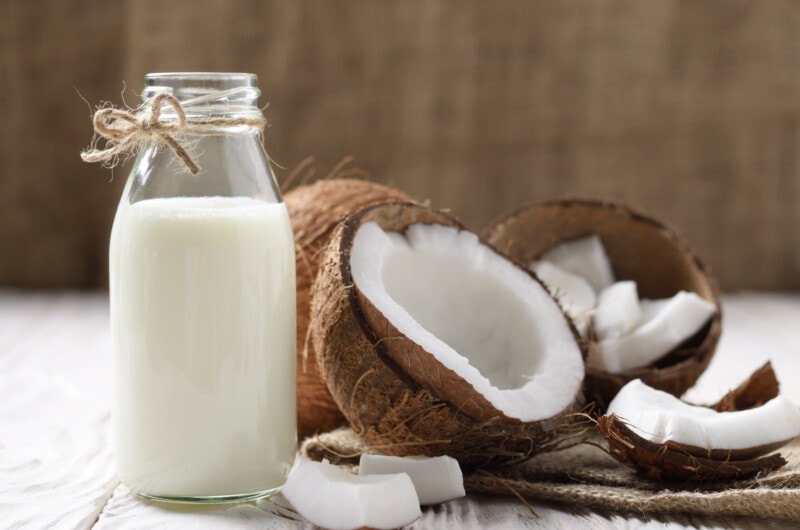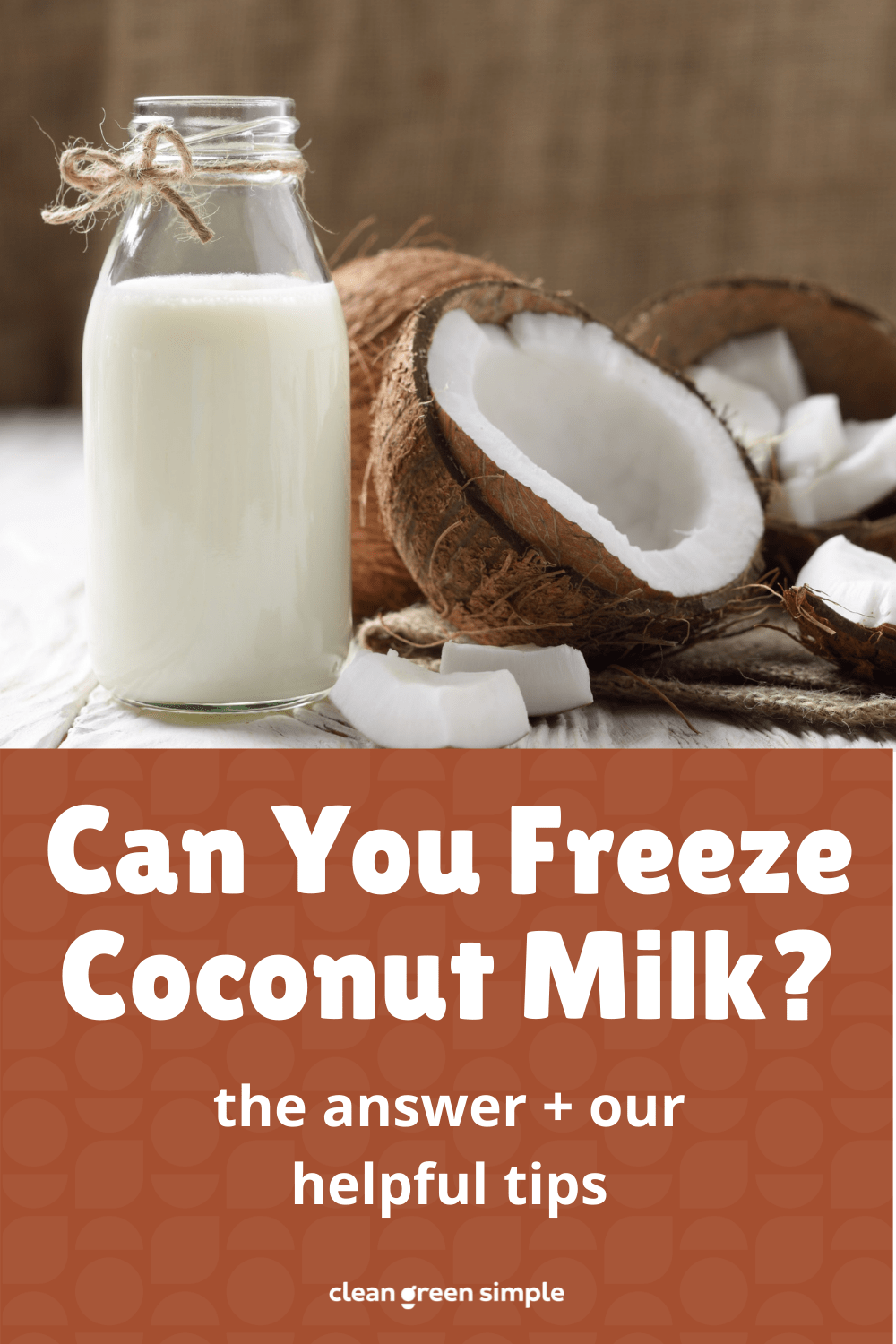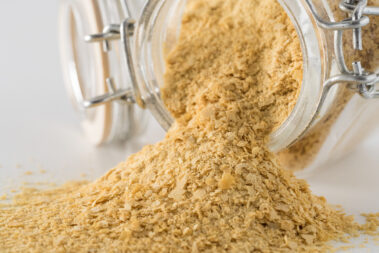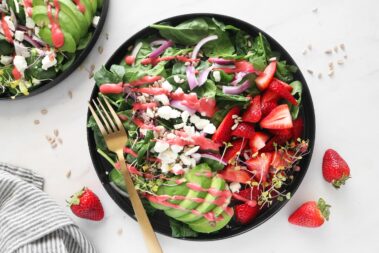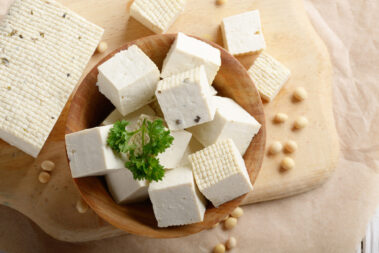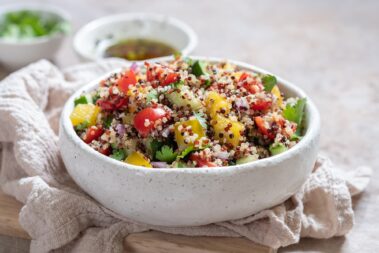That container of coconut milk has been staring at you from the back of the fridge for the last few days. It’s open and too full to waste. You try to come up with a way to use it before it goes bad, but you just keep putting it off. Finally, you wonder, can I freeze coconut milk?
The short answer is yes, you can freeze coconut milk to extend its usefulness. But before you take that answer and run with it, know there are a lot of variables that affect how true that statement is. And even more variables to consider when it comes to putting that previously frozen coconut milk to use.
Keep reading to find out what types of coconut milk you can freeze, what happens to the milk when it is frozen, how to defrost and use frozen coconut milk, and more.
Table of Contents
Different Kinds of Coconut Milk
There are two types of coconut milk you’ll find at the store. Despite being vastly different products, they are both referred to by the same name, which lends itself to a lot of confusion.
The first type is the original kind of coconut milk—this is the one older generations think of first when they hear the term. This type comes in a can and contains only coconut and water. It is used almost exclusively for cooking and baking and is too thick to drink straight. It also stays separated into fat and water at room temperature.
The second kind is the one younger generations think of when they hear the term coconut milk. This is the vegan drink that can be used in place of cow’s milk and is often consumed straight. This type is also made from strained coconuts soaked in water but includes many additional ingredients to help the fat and water stay well mixed at colder temperatures and to add flavor.
It is important to know that these two distinct products exist since there are different variables to consider when freezing each of them.
Can Coconut Milk Go Bad?
Like most food products that have been exposed to air, an opened container of coconut milk will go bad. Coconut milk that is refrigerated in the store (think, SO Delicious and Silk cartons) are highly perishable and can go bad even if they have not been opened. For these, it is important to check the expiration date and use caution when consuming them beyond this set date.
Coconut milk that has gone bad will have a sour odor much like rotten cow’s milk. It also tends to be chunky and more separated compared to fresh. Really rotten coconut milk may have mold growing on the top.
The key to saving half-used coconut milk is to freeze it before it starts to turn.
What Happens When You Freeze Coconut Milk?
Like other liquid products that have a high-fat content, freezing coconut milk leads to significant separation. As the temperature drops, the fat in the liquid freezes first, causing it to rise to the top of the suspension. Only after the temperature drops another seven to nine degrees will the water portion begin to freeze.
In terms of helping extend the life of your unused coconut milk, yes freezing does help. But it also drastically changes the texture and composition of the milk.
How to Freeze Coconut Milk
The key to freezing coconut milk is to consider how much of it you will use at a time once you are ready for it.
For large portions, such as those used for cooking and baking, pouring a premeasured amount into a tupperware container is the easiest option. Simply label the container, secure the lid, and place the liquid in the freezer.
For smaller amounts, you can pour the milk into an ice cube tray. Standard ice cube slots hold 1 ounce of liquid, which makes measuring out the exact amount of frozen coconut milk you need super simple. After you have filled the tray, let it sit in the freezer overnight, then pop the cubes into a tupperware or plastic bag and place them back in the freezer.
How Long Does Frozen Coconut Milk Last?
Technically speaking, frozen food can’t go bad. When it is kept in a completely frozen state, harmful bacteria are unable to grow, which means the food will never spoil. But there are two caveats to freezing coconut milk that will determine how long you should let it sit in the freezer.
The first has to do with the fact that modern home freezers (those attached to your fridge) don’t actually keep food completely frozen at all times. In order to avoid the ice build-up older freezers experience, these new models go through defrost cycles where the temperature in the compartment is momentarily raised above freezing.
This is why food kept in the freezer side of a refrigerator does not last as long as food in a dedicated freezer box. It is also one reason you want to use your frozen coconut milk sooner rather than later.
The second reason to limit how long you let frozen coconut milk sit in the freezer has to do with taste. After about one month, your coconut milk will begin to taste stale. This change in taste will continue to get more noticeable the longer you leave the milk frozen.
For the best-tasting milk, we recommend using it within one to three months.
How Do You Defrost Frozen Coconut Milk?
You have two options when it comes to defrosting your coconut milk. You can place it in the fridge and wait, or you can speed defrost it in warm water.
- In the fridge: place the container of frozen coconut milk in the fridge and allow it to defrost naturally. It is best to do this a day before you plan to use the milk. Coconut milk defrosted this way will last up to three days in the fridge before it goes bad.
- In warm water: place the container of frozen coconut milk in a bath of lukewarm water. Replace the water as soon as it cools to speed up the defrosting process. Depending on the volume of milk in the container, this method should give you liquid coconut milk in about thirty minutes. If you use this method for thawing, make sure you use all of the milk immediately.
How Can You Use Frozen Coconut Milk?
How you use your frozen coconut milk will depend on which type of milk you have.
Canned coconut milk typically used for cooking can be used for all the same applications once it is thawed. But before you add it to your soup or curry, you will need to blend it to mix the fat and water. This will bring the product close to its original texture.
For coconut milk made for drinking, the uses will be more limited. Even after you blend it, the texture will be too gritty to drink straight. We recommend using thawed drinking coconut milk by mixing it with other ingredients to make smoothies, protein shakes, or pancakes.
To blend thawed coconut milk, you can either add it to a blender and mix on high for about 20 seconds, or use an immersion blender for about 30 seconds. Once the liquid is mixed, use it immediately or it will start to separate again.
Can You Freeze Coconut Cream?
Coconut cream has a higher fat content than normal canned coconut milk. It is made in the same way as canned coconut milk, but with about four times as much shredded coconut to give it a creamier texture.
Like normal coconut milk, coconut cream can be frozen. Once thawed, it can be used in a wide variety of recipes. The texture will be a little less smooth and the taste slightly different, but once it is blended, it works well enough.
Can You Freeze Coconut Milk For Smoothies?
As we mentioned above, using frozen coconut milk for smoothies is one of the best applications for it, especially when it comes to the milk that comes in a carton.
The frozen fruit and other ingredients complement the changed texture of the milk well. You likely won’t even notice a difference if you put enough stuff into the mix. You can also use frozen coconut milk to make protein shakes since the powder tends to have a gritty texture on its own.
Because of the change in texture, we don’t recommend using frozen coconut milk in iced coffee or other simple drink mixes.
The Bottom Line on Freezing Coconut Milk
Yes, you can freeze coconut milk. But the type of coconut milk you are using is an important factor in determining how you can use that milk once it is thawed. And most importantly, no matter what type of coconut milk you have, know you will have to blend it before using it if you want it to taste anything like the fresh version.
- How to Pick the Perfect Watermelon For a Sweet Summer Treat - April 10, 2024
- Future Kind’s Foundations: A Multivitamin Made for Vegans - December 5, 2023
- Does Nutritional Yeast Go Bad? - November 28, 2023

